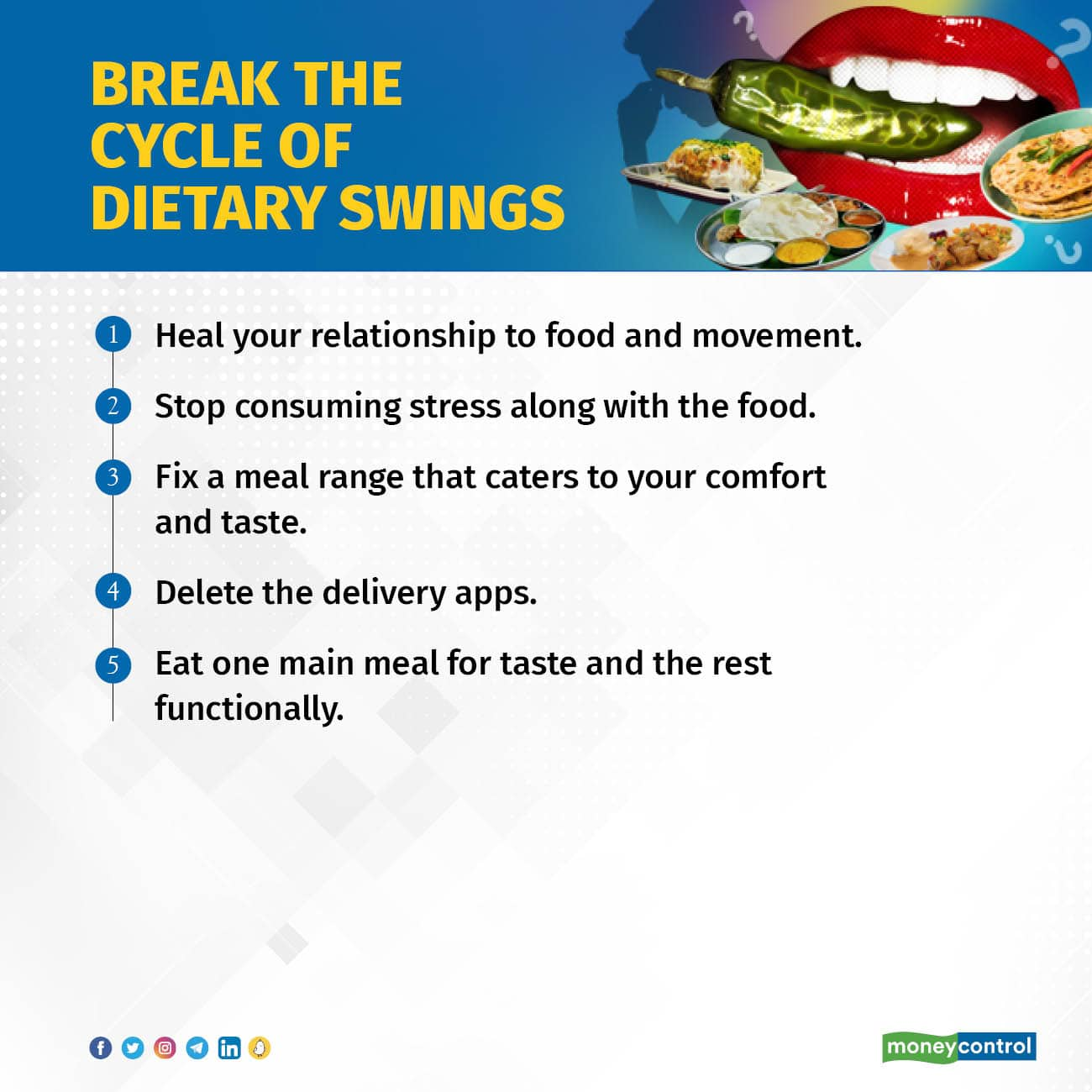



Note to readers:Healing Space is a weekly series that helps you dive into your mental health and take charge of your wellbeing through practical DIY self-care methods.
All the advice on eating out there can be too much. Eat rice, eat brown rice, eat rice sometimes, never eat rice. Then it’s compounded by ethical and planetary concerns: Eat meat, eat lean meats, too much protein will damage your kidneys, you’re ruining the environment with your demand for meat, eat mock meat, but not processed mock meat, now you’re just discriminating against meat eaters. So, you try to turn vegan or raw food  vegan, if you want to be extreme about it. But your organic veggies and almonds and avocados are sucking up ground water and funding the Mexican cartels and why are you eating so much tofu, you pro-Chinese traitor? So, by the time you figure out what it is you can eat as you send out a r/AITA thread (the answer is ‘yes’), you have tapped an app and ordered the nearest sodium-laden most highly processed form of deep-fried food you can find deliverable in 20 minutes and it’s well past midnight. So your circadian rhythms as well your digestive systems are now shot. May as well order dessert. And now everyone needs a drink.
vegan, if you want to be extreme about it. But your organic veggies and almonds and avocados are sucking up ground water and funding the Mexican cartels and why are you eating so much tofu, you pro-Chinese traitor? So, by the time you figure out what it is you can eat as you send out a r/AITA thread (the answer is ‘yes’), you have tapped an app and ordered the nearest sodium-laden most highly processed form of deep-fried food you can find deliverable in 20 minutes and it’s well past midnight. So your circadian rhythms as well your digestive systems are now shot. May as well order dessert. And now everyone needs a drink.
Is it any wonder we are all on a pendulum of unhealthy eating habits? There is just too much well-intentioned information beaming at us all the time. Our relationship to food has become fundamentally dysfunctional and traumatized. Everything you are putting into your mouth has implications for world peace and planetary survival. Even if you think you have hit on a perfect formula for a balanced diet, chances are the usage of pesticide and artificial ripening or maturation techniques influence mineral content in the produce. Even milk is boosted with some vitamin or the other. Even water is a ‘health drink’ with flavourings and additives.
So, the first step to breaking the cycle is to refuse to participate in and contribute to the commotion. The environment of food is fraught with worry. It is no longer a safe space. Whatever you eat, you are partaking of stress. Stop reading, stop assimilating, stop looking up every dietary tip that can change your pattern, stop social media-posting your food, and looking up others’ recipes and lunches. Sorry, this will not be popular, but it is what it is. Stop foodscrolling, like doomscrolling. It creates a constant perception of what one should be eating and how one should eat it and where. So your mind is constantly jumping to the better option. It’s like being married and staying on the dating apps. Why are you giving yourself endless options? How will your marriage, any marriage, ever work like that? Choose peace, your own.
Second, recognize that just because the world has options, you don’t need to exercise all of them. Pick a standardized meal range that feels comfortable to you for your daily needs and stick to it. What this broadly means is whether you eat fish curry and rice or sambar and ragi mudde or bhakri usal or paneer paranthas or khichdi, have a fundamental home meal that is basic, comforting and easy to prepare. If you have medical requirements such as avoiding carbohydrates due to diabetes, incorporate only those doctor-prescribed modifications. Don’t tell yourself this is what you will eat till Sunday, or for 20 days to make a habit, or until you see a change, or any of those fad listicle ways of being. You are de-fadding your food completely. If you had to eat one set of meals every day for the rest of your life (with normal variations within them for taste and variety, of course), what would you eat? Eat that.
Third, delete your food delivery apps. Sorry. This is non-negotiable. If you want to radically change your relationship to food, stop flirting with other people in your marriage. Eat what you cook. If you want to eat out, go out with friends, sit at a restaurant and have a meal with them. You will order one dish and limit your treats. You will be engaged in conversation rather than focus on the food or mindlessly eat more than you intend to in front of the television. ‘Treat’ food is meant for socializing. So, restrict it to social occasions. You’ll also save a tonne of money that you can now invest in a SIP. You’re welcome.
Fourth, eat what you want and feel like within this range you have picked out, for one meal in a day, according to your medical requirements if any. Eat your mom’s sambar and your dad’s bisi bele bhat and your wife’s dal bati. Once you have satiated your taste and comfort requirements, you will find what you crave in the rest of the day drops tremendously. Enjoy your one meal. Keep everything else strictly functional. To prevent acidity, to keep your energy up, and to clock the nutritional requirement.
Fifth. Move. Note I didn’t say exercise. Exercise is another fraught area now. Overthinking everything is an exercise in stress alone. Have movement to feel alive, to connect with nature, to watch the dawn, catch some sunlight and air, to get something out of your system, to see and greet people, to play, to compete, to feel part of a team. What you do is not as important as getting those endorphins going. Feel good as you move.
You may not lose drastic weight to begin with. But you will relax. You will destress. You will first heal your relationship to food and eating. Enjoy the ingredients. Value your home cuisine. Play with the variety. Enjoy cooking. Take walks together. Find swims invigorating. Play a great game. Work out food associations and triggers with a therapist. When you start to enjoy food and movement again, your stress will stop being triggered by food and cravings. Then, you can heal the body.

Discover the latest Business News, Sensex, and Nifty updates. Obtain Personal Finance insights, tax queries, and expert opinions on Moneycontrol or download the Moneycontrol App to stay updated!
Find the best of Al News in one place, specially curated for you every weekend.
Stay on top of the latest tech trends and biggest startup news.